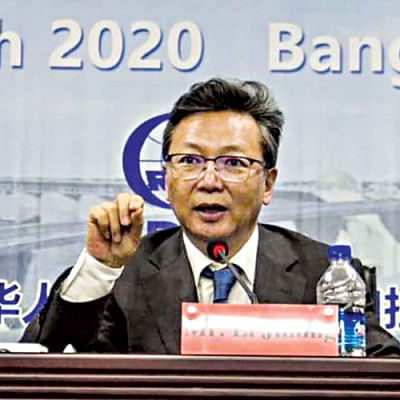If Dhaka joins Quad, it’ll harm ties with Beijing

Chinese Ambassador to Bangladesh Li Jiming has said Bangladesh should not join "Quad", a US-led initiative, and Dhaka's relations with Beijing will "substantially get damaged" if it joins the initiative.
He termed "Quad" a military alliance aiming against China's resurgence and its relationship with neighbours.
The ambassador said Quad is a "narrow-purposed" geopolitical clique, and Bangladesh should not join it as the country will not derive any benefit from the initiative.
The US, India, Japan and Australia are part of an informal strategic alliance -- the Quadrilateral Security Dialogue, or Quad as it is known.
"History has proved again and again such partnership surely damages our neighbours' own social, economic development and people's well-being," Ambassador Li said.
The Chinese envoy was speaking at a virtual programme with the members of Diplomatic Correspondents Association, Bangladesh (DCAB) yesterday.
DCAB President Pantho Rahaman and General Secretary AKM Moinuddin also spoke at the event.
On April 27, Chinese State Councillor and Minister of National Defence Wei Fenghe met President Abdul Hamid. The two sides agreed to advance bilateral military cooperation.
To jointly maintain regional peace and stability, the two countries should make joint efforts against powers outside the region, setting up military alliance in South Asia and practising "hegemonism", Wei was quoted by Xinhua as saying.
Known as the "Quadrilateral Security Dialogue," representatives of the four Quad member nations met periodically since its establishment in 2007.
ROHINGYA, TEESTA
The Chinese ambassador said no one can say that the situation in Myanmar is improving. He said Bangladesh will have to wait to resume the tripartite talks on Rohingya repatriation with China and Myanmar.
He said China could not contact the Myanmar government on the Rohingya repatriation issue as the situation there was not normal now.
Two repatriation attempts turned futile as Myanmar "failed to remove trust deficit" among the Rohingyas and there was a "lack of conducive environment" in Rakhine for their return.
Bangladesh and Myanmar signed the repatriation deal on November 23, 2017. On January 16 the following year, Bangladesh and Myanmar signed a document on "Physical Arrangement", which was supposed to facilitate the return of Rohingyas to their homeland.
Bangladesh says Rohingyas do not trust their government and it gave a number of proposals to build trust among them. Myanmar did not say "no" to those proposals but no proposal was implemented.
Responding to another question, Ambassador Li said China will sincerely consider its engagement in the Teesta river management project if the country gets a feasibility study report on the project.
The Bangladesh government should conduct a study on the project first before sending the proposal, he added.

 For all latest news, follow The Daily Star's Google News channel.
For all latest news, follow The Daily Star's Google News channel. 



Comments